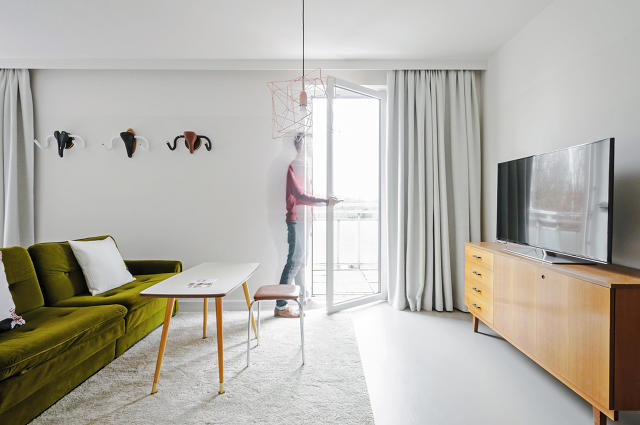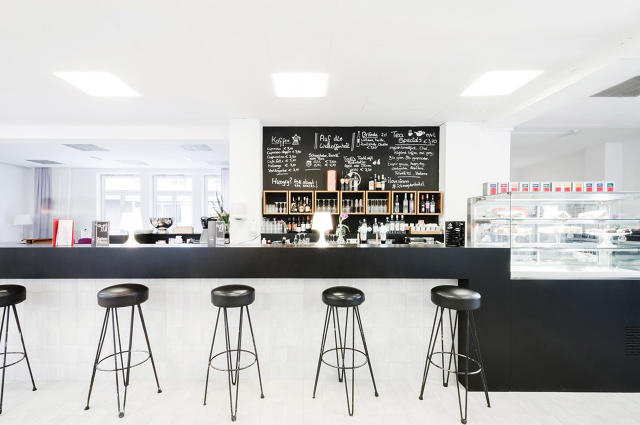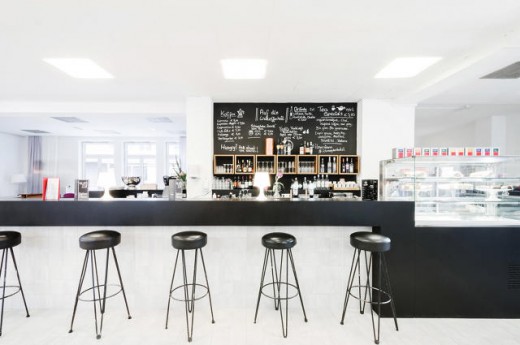At This Boutique Hotel, Tourists Stay Next To Refugees
Travelers get a reality check on the lives of others when they check in to Vienna’s Magdas hotel.
The new Magdas Hotel in Vienna looks like a typical boutique hotel, with minimal modern rooms furnished with vintage and upcycled furniture, a well-stocked bar, and balconies with a view of the city’s famous giant Ferris wheel. But when guests come to stay, they’re down the hall from a suite where a very different kind of group is staying: young refugees who have fled their countries.
“We wanted to build a place where tourists from all over the world are welcomed by people who left their home not because they wanted to, but because they needed to—because they’re fleeing from hunger, war, or terrorism,” says Martin Gartner from Caritas, the Viennese nonprofit that launched the hotel as a social enterprise. Almost everyone who works at the hotel—from the reception staff to the people serving breakfast—are also refugees.

Hotel guests meet people like Denis, a 28-year-old refugee from Guinea-Bissau who speaks six or seven languages. “He’s lived in Austria for almost 10 years, and during this period of time he had no possibility to work, because it’s very hard for refugees or asylum-seekers in Austria to get a job,” says Gartner. “For 10 years, he had nothing to do but to wait. Now he has his first job, he works at the reception, and he’s very willing to tell his story to everyone who asks.”
The hotel employs refugees from Syria, Iran, Afghanistan, and 11 other countries, all of whom have struggled to find work elsewhere. “It’s very interesting to see this team speaking 25 languages or so, and have different religions, to see how they work together and how they have the same goal—to keep this hotel running,” Gartner says.
Two suites at the hotel house asylum-seekers under the age of 18, who are living in Austria without family. The hotel lounge doubles as their living room. By the fall, a handful of the young hotel guests will also be able to work in a new apprenticeship program.

For guests, it’s a chance to learn about a different part of life in Vienna. While it might be common for hotels to employ housekeepers from another part of the world, it isn’t common for hotels to encourage guests to get to know them. “This isn’t like any other hotel,” Gartner says. “Guests get a feeling for the social impact.”
The business is also designed to help change how people think about refugees. “We have a lot of discussions in Europe about refugees,” says Gartner. “Most of the time it’s about problems—growing numbers of asylum seekers. And then there’s this hotel. It’s not about problems anymore, it’s about a solution. How you can enable people to work and enable people to be part of society.”
In a few years, the nonprofit may open another hotel, also run as a financially self-sufficient social enterprise. “At the moment, it keeps us busy to run this one,” Gartner says. “But we’re very happy that other NGOs from Berlin, Amsterdam, and other cities are asking how we did it and how it works. … I think there’s a chance other initiatives will copy this project.”
Fast Company , Read Full Story
(152)














